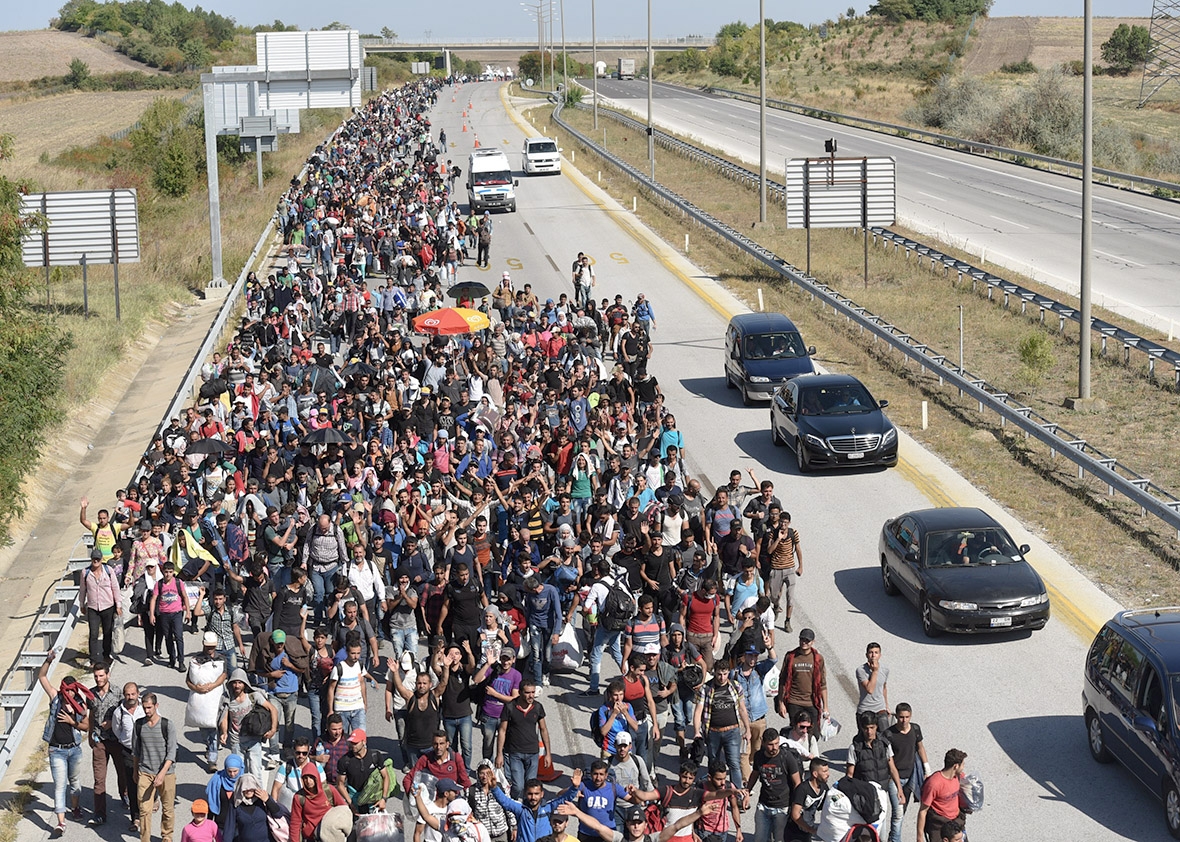Montreal's Olympic Stadium used to house surge in asylum seekers from U.S.
A temporary welcome centre has been opened at the Olympic Stadium in Montreal to house a surge of asylum seekers coming from the United States to Quebec.
"We've never seen this before," said Francine Dupuis, spokesperson for PRAIDA, the provincial government organization that helps claimants in their first months.
"It's really quite a bit more intense than what we're used to."
On Wednesday, asylum seekers were taken to the Olympic Stadium by bus. Among them were children and pregnant women.
A spokesperson for Olympic Park said the request to use the stadium came on Friday.
"We were quick to say, 'OK, how much space do we need?'" Cédric Essminimy said. "And in 24 hours, everything was set."
Though official numbers have not been released by the federal government, Dupuis estimates 1,174 asylum seekers crossed into Quebec in July. In comparison, PRAIDA helped 180 people in July 2016.
Olympic Stadium is one of Montreal's most well-known landmarks. It was built in the early 1970s as a venue for the 1976 Summer Olympics. Known locally as the Big O, it was home to the Montreal Expos until the team left the city in 2004.
In May, U.S. President Donald Trump threatened to withdraw the protective status of Haitians who took refuge in the country following the 2010 earthquake.
Up to 58,000 people could face deportation back to Haiti in January 2018.
Dupuis said Montreal's large Haitian community is a reason why many Haitians are crossing the border into Quebec.
"Obviously, there is a stronger attraction to coming to Quebec for Haitians than in other provinces," she said.
"They have the help of their community to get settled."
A spokesperson for the Maison d'Haiti, a hub for the Haitian community in Montreal, said they've been hearing from families living in the U.S. hoping to come to Canada.
"They are afraid of what is going to happen to them," said Marjorie Villefranche, director general of the Maison d'Haiti.
In the last three weeks especially, a larger number of Haitians have been crossing the border asking for refugee statusm she said. Villefranche said the Maison d'Haiti helps asylum seekers fill out paperwork to be able to stay in Canada.
She said word of how to cross into Canada has spread quickly on Haitian social networks, encouraging more people to come to Quebec.
However, it's unclear if they'll be able to stay. Asylum seekers originally from Haiti who have crossed the Canada-U.S. border could be deported back to Haiti if their application is refused because Canadian authorities deem Haiti as a sufficiently safe country.
Montreal's Olympic Stadium used to house surge in asylum seekers from U.S. - Montreal - CBC News
A temporary welcome centre has been opened at the Olympic Stadium in Montreal to house a surge of asylum seekers coming from the United States to Quebec.
"We've never seen this before," said Francine Dupuis, spokesperson for PRAIDA, the provincial government organization that helps claimants in their first months.
"It's really quite a bit more intense than what we're used to."
On Wednesday, asylum seekers were taken to the Olympic Stadium by bus. Among them were children and pregnant women.
A spokesperson for Olympic Park said the request to use the stadium came on Friday.
"We were quick to say, 'OK, how much space do we need?'" Cédric Essminimy said. "And in 24 hours, everything was set."
Though official numbers have not been released by the federal government, Dupuis estimates 1,174 asylum seekers crossed into Quebec in July. In comparison, PRAIDA helped 180 people in July 2016.
Olympic Stadium is one of Montreal's most well-known landmarks. It was built in the early 1970s as a venue for the 1976 Summer Olympics. Known locally as the Big O, it was home to the Montreal Expos until the team left the city in 2004.
In May, U.S. President Donald Trump threatened to withdraw the protective status of Haitians who took refuge in the country following the 2010 earthquake.
Up to 58,000 people could face deportation back to Haiti in January 2018.
Dupuis said Montreal's large Haitian community is a reason why many Haitians are crossing the border into Quebec.
"Obviously, there is a stronger attraction to coming to Quebec for Haitians than in other provinces," she said.
"They have the help of their community to get settled."
A spokesperson for the Maison d'Haiti, a hub for the Haitian community in Montreal, said they've been hearing from families living in the U.S. hoping to come to Canada.
"They are afraid of what is going to happen to them," said Marjorie Villefranche, director general of the Maison d'Haiti.
In the last three weeks especially, a larger number of Haitians have been crossing the border asking for refugee statusm she said. Villefranche said the Maison d'Haiti helps asylum seekers fill out paperwork to be able to stay in Canada.
She said word of how to cross into Canada has spread quickly on Haitian social networks, encouraging more people to come to Quebec.
However, it's unclear if they'll be able to stay. Asylum seekers originally from Haiti who have crossed the Canada-U.S. border could be deported back to Haiti if their application is refused because Canadian authorities deem Haiti as a sufficiently safe country.
Montreal's Olympic Stadium used to house surge in asylum seekers from U.S. - Montreal - CBC News



